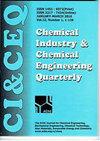Magnesium removal from phosphoric acid by precipitation: Optimization by experimental design
IF 0.8
4区 工程技术
Q4 CHEMISTRY, APPLIED
Chemical Industry & Chemical Engineering Quarterly
Pub Date : 2021-01-01
DOI:10.2298/ciceq200101030m
引用次数: 2
Abstract
High content of magnesium in phosphate and phosphoric acid affects negatively the performance and operating conditions in phosphate industry. A content of more than 0.3% in phosphate increases the P2O5 losses during phosphate digestion and filtration, and also increases steam consumption and solid settling kinetics during concentration. In this work, the removal of magnesium from phosphoric acid by precipitation in one of the compounds, MgAlF5 or MgAl2F8, was studied. Magnesium precipitation is achieved by the simultaneous addition of aluminum and fluorine. The experimental design methodology was used to carry out this work. Tests were conducted according to the NEMRODW software using industrial quality phosphoric acid. The screening study of parameters affecting the removal efficiency of magnesium from industrial wet phosphoric acid showed that from the following parameters: temperature, F/Mg and Al/Mg ratios, aluminum form and fluorine form, only temperature and F/Mg ratio have an effective influence on magnesium removal. The optimization of magnesium removal from phosphoric acid was performed according to the response surface methodology using a composite matrix. By applying this methodology, the optimum parameters corresponding to a maximum magnesium removal efficiency in phosphoric acid were determined. The values of the optimum parameters obtained by this method are T = 80 ?C, ratios: Al/Mg = 1 and F/Mg = 16.沉淀法去除磷酸中的镁:实验设计优化
磷酸盐和磷酸中镁的高含量对磷酸盐工业的性能和操作条件产生不利影响。磷酸盐含量超过0.3%会增加磷酸盐消化和过滤过程中的P2O5损失,也会增加浓缩过程中的蒸汽消耗和固体沉降动力学。本文研究了用MgAlF5或MgAl2F8沉淀法去除磷酸中的镁。镁的沉淀是通过同时加入铝和氟来实现的。本研究采用实验设计方法。使用工业质量磷酸,根据NEMRODW软件进行测试。对影响工业湿式磷酸中镁脱除效率的参数筛选研究表明,在温度、F/Mg和Al/Mg比、铝形态和氟形态等参数中,只有温度和F/Mg比对镁的脱除有有效影响。采用复合基质响应面法对磷酸中除镁工艺进行了优化。应用该方法,确定了与磷酸中最大脱镁效率相对应的最佳参数。该方法得到的最佳工艺参数为:温度= 80℃,Al/Mg = 1, F/Mg = 16。
本文章由计算机程序翻译,如有差异,请以英文原文为准。
求助全文
约1分钟内获得全文
求助全文
来源期刊

Chemical Industry & Chemical Engineering Quarterly
CHEMISTRY, APPLIED-ENGINEERING, CHEMICAL
CiteScore
2.10
自引率
0.00%
发文量
24
审稿时长
3.3 months
期刊介绍:
The Journal invites contributions to the following two main areas:
• Applied Chemistry dealing with the application of basic chemical sciences to industry
• Chemical Engineering dealing with the chemical and biochemical conversion of raw materials into different products as well as the design and operation of plants and equipment.
The Journal welcomes contributions focused on:
Chemical and Biochemical Engineering [...]
Process Systems Engineering[...]
Environmental Chemical and Process Engineering[...]
Materials Synthesis and Processing[...]
Food and Bioproducts Processing[...]
Process Technology[...]
 求助内容:
求助内容: 应助结果提醒方式:
应助结果提醒方式:


